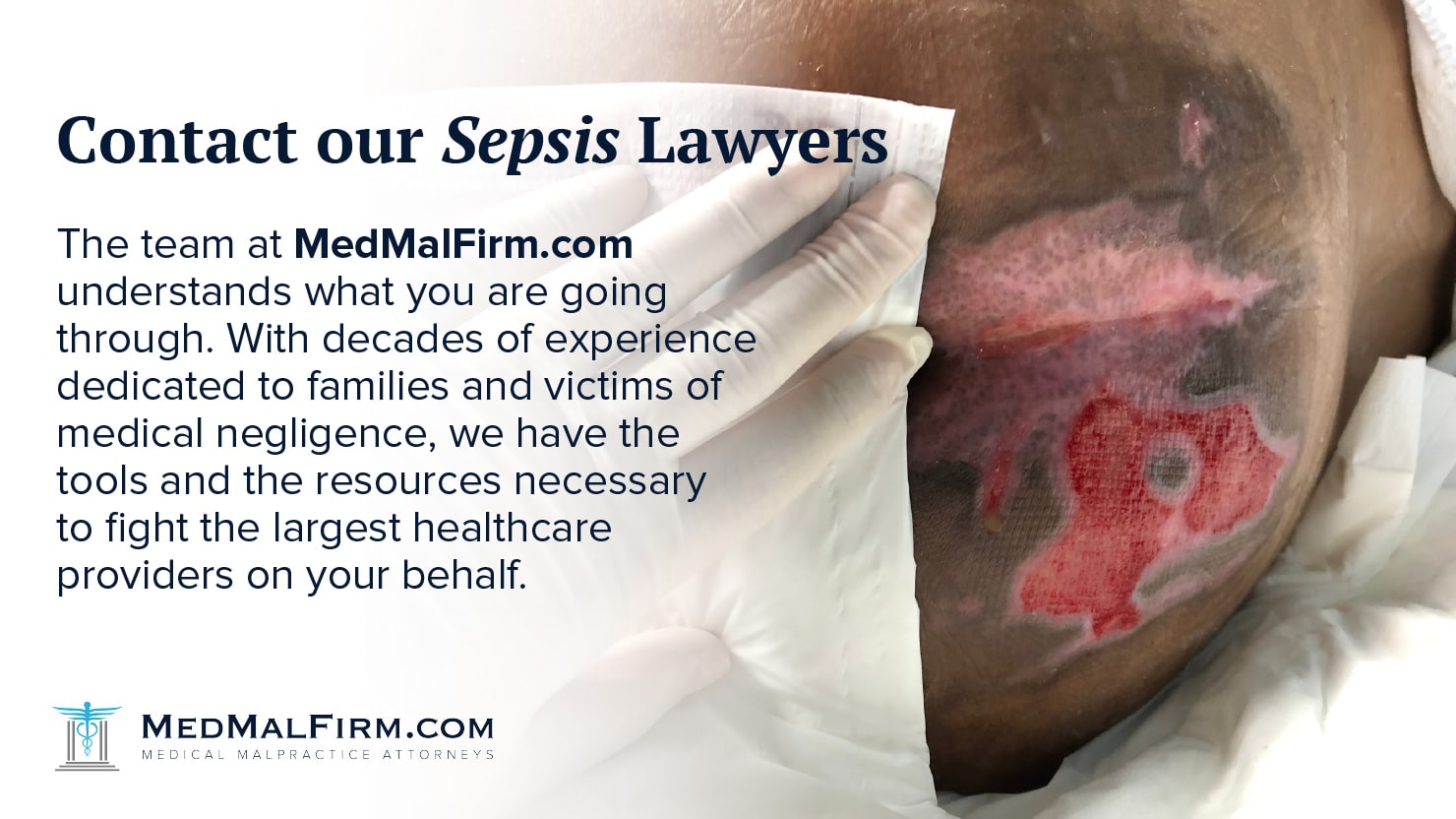Sepsis
At MedMalFirm.com, our team of lawyers and healthcare professionals want you to be informed about sepsis, how it develops, and what you can do to reduce the risk of developing it while in a hospital. Learn more about sepsis by viewing the content below. If you have questions, don’t hesitate to contact us!
Sepsis is a very serious complication caused by the body’s overwhelming response to an infection. If left untreated, it can cause serious illness or injuries, or can even be fatal. While it can happen to anyone, it is more common in elderly patients or those who have reduced function of their immune system. Once sepsis progresses to septic shock, damage to the organs can be so severe that it causes them to fail.
Severe cases of sepsis are a medical emergency. Learn more about sepsis below – but if you are having a medical emergency, please contact your doctor right away.
What is Sepsis?
There is a common misconception that sepsis is an infection. It isn’t. It is the body’s response to an infection. This is an important distinction, and is important when considering how it develops and how it is treated.

Sepsis can occur in anyone who has an infection. It can develop in any part of the body – skin, urinary tract, gastrointestinal tract, lungs – anywhere. Some of the more common initial infections that lead to sepsis are:

Without proper diagnosis and treatment, sepsis can quickly cause complications. The inflammatory response can spread to tissue, organs, kidneys, the heart, and the brain. The result of severe sepsis can be severe enough to cause organ failure, blood clots, and death.
According to the Centers for Disease Control and Prevention (CDC), around 1.7 million adults develop sepsis each year in the United States. Of those, almost 270,000 patients die as a result of the condition or related complications.
Who is At Risk?
Anyone who develops an infection is at risk for sepsis. According to the National Institutes of Health (NIH), people who are at a higher risk are:
- Children under one year old
- Women who are pregnant
- People who have a weakened immune system
- Adults over 65 years old
- People who have chronic diseases like cancer, lung disease, kidney disease, or diabetes
- Hospital patients who have open wounds, burns, or bedsores
- Patients relying on breathing tubes or catheters
- Patients who have previously been given corticosteroids or antibiotics to treat infection
These individuals are at a higher risk of developing sepsis and should be monitored closely in a hospital or nursing home setting. That is because proper infection control procedures can help ensure that infections do not escalate. A minor infection can escalate without any warning.
What are the Symptoms?
If you have an infection and it doesn’t seem to be getting better, you may be wondering if you have sepsis. Sepsis, as opposed to a typical infection, can be identified by the following symptoms:
- Increased heart rate
- Increased blood pressure
- Disorientation or confusion
- Sudden changes in mental status
- Shortness of breath
- Fever with chills
- Sweaty or clammy skin
- Pain or discomfort
- Decreased urination
Because sepsis usually occurs in people who are hospitalized, if there is a failure to diagnose the patient followed by a failure to treat the infection, the healthcare facility could have acted negligently and there may be a case for medical malpractice. MedMalFirm.com can help you find out.
Undiagnosed Sepsis Can Lead to Septic Shock
If doctors do not diagnose or treat severe sepsis in a timely manner, it can progress to septic shock. Septic shock involves changes in the body’s circulation and cells, and how the body uses energy. Septic shock occurs in patients who have an infection, but also:
- Require medication to keep blood pressure stable.
- Have high lactic acid (serum lactate) in the blood, which indicates that the body is not properly using oxygen.
Once sepsis progresses to septic shock, there may be significant damage to tissue, organs, and bodily functions. The mortality rate among patients with septic shock is alarming, with more than 50 percent of patients with this diagnosis dying as a result.
Injuries Caused by Sepsis

Sepsis can also be fatal. In fact, research suggests that death rates are much higher than previous estimates. As many as 11 million people die each year due to sepsis.
Also, some medications used to treat the symptoms of sepsis could be harmful when incorrectly managed.
Know Your Rights
If you or a loved one was under the care of a healthcare professional and was severely injured, or you’ve lost a family member due to sepsis, it is important to understand that this is not your fault.
You likely have many unanswered questions: How did they not know? Why didn’t they act fast enough? Why did this happen?
Failure to diagnose or treat sepsis, or misdiagnosis, can be considered negligent, or mean that the healthcare professional simply did not provide the standard of care that the law requires. To determine whether or not you have a medical malpractice claim, we urge you to contact an experienced attorney who can help you understand what your legal rights are and what you need to do in order to pursue legal action.
Contact our Houston Sepsis Lawyers
Medical malpractice is a very complex area of law. Failure to diagnose or treat sepsis will fall under this type of claim. In most cases, the burden of proving that the healthcare facility is negligent will be on the victim or their family. This is a burden that can prove to be very arduous and emotional for all of the people affected.

Contact our office today. Our Houston sepsis lawyers will review your case free of charge and without any obligation. We will help you understand the legal process and answer any questions you may have. You certainly don’t have to go through this alone. Our team is here to help you.
